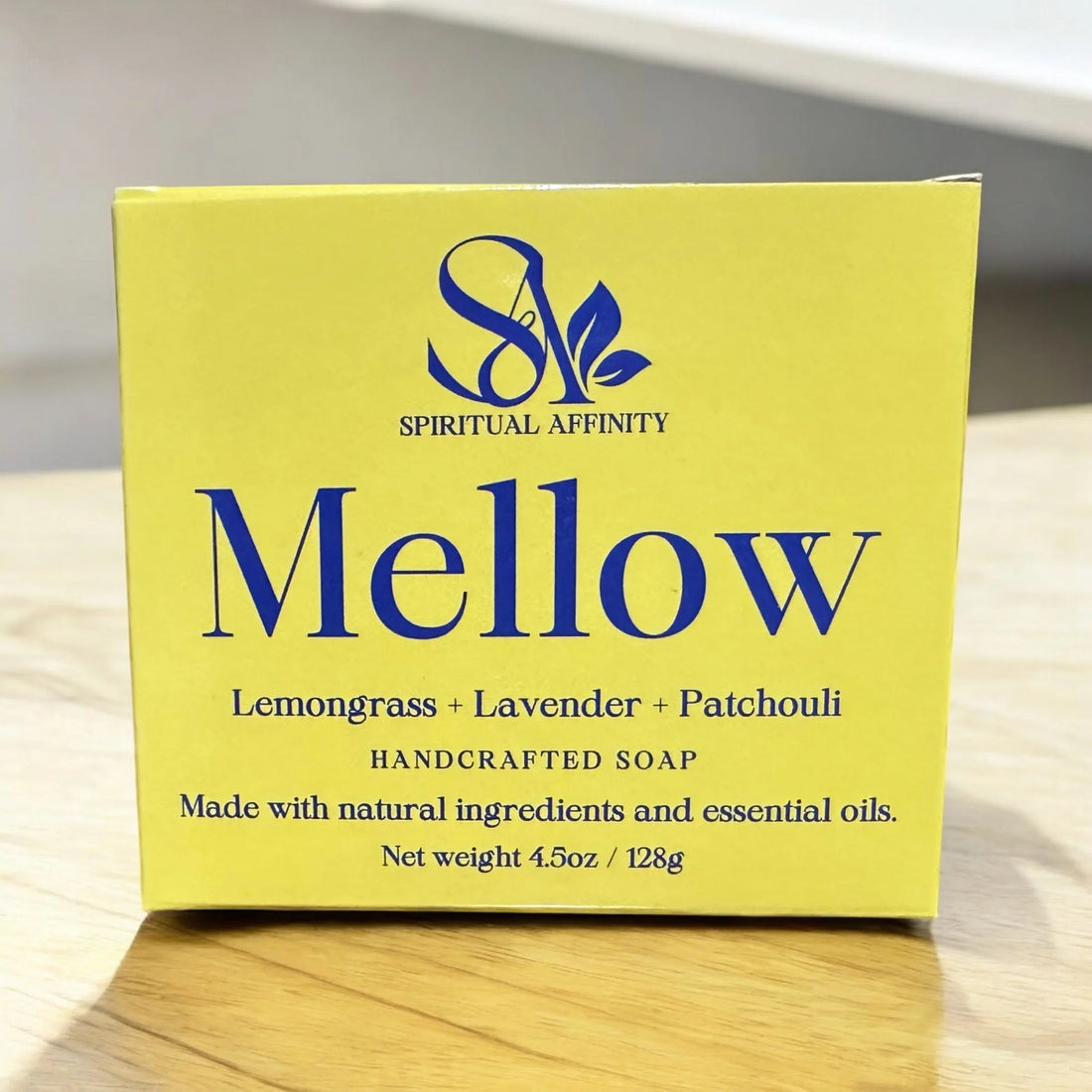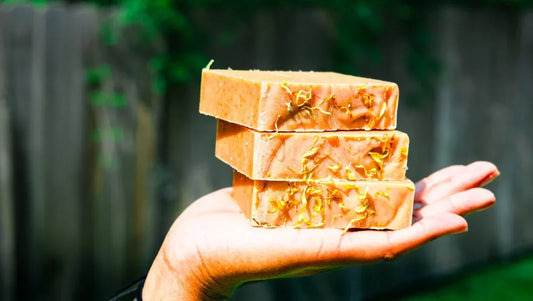
Natural vs. Commercial Body Soaps: Which One is Better for Your Skin?
Your skin is your largest organ. What you lather on it daily can significantly impact your health and how your skin looks and feels. This article isn't just about soap—it's about making informed decisions for your body and well-being. Whether you're someone who’s already ditched sulfates or just starting to question what chemicals are in soap, you’ll find clarity here.
By the end, you'll not only understand the differences between nature soap and chemical soap but also discover which is a better fit for your skin, lifestyle, and even the planet. Spoiler alert: not all soaps are created equal.

What Is Natural Soap?
Natural soap is like that one friend who always brings organic snacks to the party—it’s clean, honest, and usually better for you. Unlike its synthetic cousins, natural soap is made using simple, nontoxic soap ingredients. Think cold-pressed oils, herbal extracts, essential oils, and lye (yes, the real soap base). No parabens. No phthalates. No chemical mystery meat.
Most natural soaps are created through cold-process or hot-process methods, preserving the nourishing qualities of ingredients like shea butter, coconut oil, olive oil, and castor oil. You’ll often find bonuses like oatmeal (great exfoliant), activated charcoal (hello detox), or lavender (aromatherapy win).
Here’s why people are switching:
- Gentle on sensitive skin: No harsh sulfates or dyes to strip your skin.
- Eco-conscious: Biodegradable ingredients and minimal packaging.
- Therapeutic value: Many include aromatherapeutic essential oils.
And let’s not forget the feel-good factor. You’re not just buying soap; you’re supporting small artisans, local farms, and clean beauty movements.
What Is Commercial Soap?
If natural soap is your organic foodie friend, commercial soap is that fast-food meal—cheap, widely available, and questionably “real.” Most commercial soaps aren’t technically soap at all. They're classified as syndets—synthetic detergents that use chemical cocktails to clean.
These soaps are mass-produced using commercial soap ingredients like sodium lauryl sulfate, synthetic fragrances, artificial dyes, and preservatives. Why? Because they’re cheap to produce, have a long shelf life, and can be made in large batches quickly.
Common commercial soap ingredients include:
- SLS and SLES (sulfates)
- Parabens
- Triclosan (antibacterial agent, now banned in some places)
- Petrochemicals
- Artificial fragrances and dyes
Why do people still buy them?
- Convenience: Available everywhere, from supermarkets to gas stations.
- Affordability: Often cheaper upfront.
- Familiarity: Trusted brands dominate the market.
But while they might clean you on the surface, commercial soaps can strip your skin’s natural oils, irritate sensitive skin, and introduce potentially harmful toxins into your body and the environment.
Key Differences Between Natural and Commercial Soaps
| Feature | Natural Soap | Commercial Soap |
|---|---|---|
| Ingredients | Plant-based, non-toxic | Synthetic, often chemical-heavy |
| Skin Benefits | Moisturizing, healing | Can cause dryness, irritation |
| Production | Small batch, artisan | Mass-produced |
| Lather | Creamy, gentle | Rich, due to foaming agents |
| Scent | Essential oils | Artificial fragrances |
| Environmental Impact | Low | High, due to chemicals and waste |
| Price | Slightly higher | Lower upfront |
Understanding Soap Ingredients
Have you ever flipped over a soap bar and felt like you were reading a science textbook? Let’s decode that.
What Chemicals Are in Soap?
Chemical soap usually includes:
- Sodium Lauryl Sulfate (SLS): Strips oils and can irritate skin
- Propylene Glycol: A moisture-retainer that can trigger allergies
- Triclosan: An antibacterial that’s been linked to hormone disruption
- Fragrance: A broad term that can mask 100+ chemicals
These chemicals often serve as foaming agents, preservatives, or artificial scents—but they don’t do your skin any long-term favors.
Benefits of Soaps Without Chemicals
Natural soaps with nontoxic soap ingredients are:
- Less irritating to the skin
- Safer for the environment
- More hydrating thanks to glycerin (a natural byproduct often removed in commercial soap)
How to Read a Soap Label
Look for:
- Short ingredient list: You should recognize most names
- No artificial fragrance or color
- Mention of "cold process" or "handmade."
Skip the ones with “parfum,” “fragrance,” or long unpronounceable ingredients.
Nature Soap: Why It’s Trending
Ever noticed how “natural” is the new cool in skincare? That’s because more people are waking up to what they’re actually putting on their skin—and they’re not liking what they see in commercial soap labels.
Nature soap, also called natural or organic soap, is gaining ground fast thanks to the clean beauty movement. It’s not just a trend—it’s a shift in how we think about wellness and sustainability.

Why People Are Switching to Nature Soap:
- Cleaner Ingredients: No sulfates, no synthetic dyes, no harmful preservatives.
- Sustainability: These soaps often come in plastic-free packaging and contain biodegradable ingredients.
- Artisan Quality: Small-batch production means more care goes into every bar.
- Skin Benefits: Real oils, butter, and clays naturally cleanse, exfoliate, and nourish.
The rise in nontoxic soap ingredients like olive oil, activated charcoal, turmeric, and calendula reflects consumer demand for products that don’t just “clean”—they heal and nourish. Plus, the scent? Think fresh lavender, real citrus, or calming eucalyptus—not artificial perfumes that give you a headache.
If you haven’t hopped on the natural soap train yet, this is your sign.
Hidden Dangers of Chemical Soaps
Chemical soaps might look harmless—hey, they smell great and bubble like a dream—but they often come with a list of side effects that are rarely discussed on the label.
1. Long-Term Skin Issues
Chemical soap ingredients like SLS and triclosan can strip the skin’s protective barrier, leading to:
- Dryness and flakiness
- Redness and irritation
- Worsening of eczema or psoriasis
Sensitive skin types may especially feel the brunt, experiencing breakouts or rashes that mysteriously won’t go away—until they switch to a milder, chemical-free alternative.
2. Environmental Toxicity
When you wash off a commercial soap, it doesn’t just go down the drain—it goes into our water systems. Many synthetic ingredients like microbeads, preservatives, and harsh detergents are non-biodegradable and can harm aquatic life.
3. Endocrine Disruptors and Allergens
Certain ingredients in commercial soap, such as parabens and phthalates, are known endocrine disruptors. That means they can mess with your hormones. Over time, this can lead to bigger health concerns, especially with consistent, daily exposure.
So, while the upfront cost of a natural soap might be a bit more, the long-term savings—for your health and the planet—are priceless.
Natural Soap for Different Skin Types
One of the biggest misconceptions about natural soaps is that they’re “one size fits all.” Not true. Whether you have oily skin, dry patches, or sensitive skin that reacts to everything, there’s a nature soap tailored to you.
For Oily Skin
Look for natural soaps with:
- Activated charcoal (detoxifying)
- Tea tree oil (antibacterial)
- Clay (absorbs excess oil)
These ingredients help regulate sebum production without over-drying.
For Dry Skin
Best picks include:
- Shea butter
- Olive oil
- Goat milk
These are intensely hydrating and help repair the skin’s moisture barrier.
For Acne-Prone Skin
Go for:
- Neem or turmeric-based soaps
- Antibacterial essential oils like eucalyptus or tea tree
- Gentle exfoliants like oatmeal
Natural soaps gently address acne without triggering inflammation or allergic reactions. And since they don’t contain pore-clogging synthetic fragrances or preservatives, they let your skin breathe.
Commercial Soaps: Do They Have Any Benefits?
Okay, so we’ve bashed commercial soaps quite a bit—but let’s be fair. They do have a few upsides, especially when viewed from a practical angle.
1. Cost-Effective
If you’re on a tight budget, commercial soap can seem like the obvious choice. You can get a multipack for the price of one artisan bar. For families or high-usage households, this can add up.
2. Accessibility
You’ll find them everywhere—from gas stations to grocery stores. That convenience factor is hard to beat.
3. Long Shelf Life
Thanks to preservatives, commercial soaps can sit in your cupboard for years without going bad. This makes them a reliable option for emergencies, travel, or guest bathrooms.
But here’s the catch: while they may win on convenience and price, they often lose big on long-term skin health and sustainability.
So, if you’re using commercial soap and wondering why your skin always feels tight or itchy afterward, the soap could be the culprit.
Common Myths About Natural Soaps
There’s a lot of misinformation floating around when it comes to natural soaps. Let’s clear up a few of the biggest myths:
1. Natural Soaps Don’t Lather
False. Natural soaps do lather—it’s just a different kind of lather. Commercial soaps often use sulfates like SLS to create big, bubbly foam, which isn’t necessary to clean your skin. Natural soaps lather with creamy, silky foam from oils and butter. It’s gentler but just as effective.
2. Natural Means Ineffective
Wrong again. Natural doesn’t mean weak. In fact, many nature soap ingredients like tea tree oil, turmeric, and neem are antibacterial, anti-inflammatory, and more powerful than synthetic additives. It’s not about harshness—it’s about harmony with your skin’s natural balance.
3. All Commercial Soaps Are Harmful
Not all commercial soaps are evil villains. Some brands make an effort to reduce toxic ingredients, and some people’s skin can tolerate commercial formulas. But the keyword here is some. Natural soaps, on the other hand, work with your body, not against it.
By busting these myths, we hope more people will feel confident making the switch—and enjoy the benefits that come with it.
Explore a wide range of high-quality natural body soaps curated for all skin types.
What Dermatologists Say
Okay, we’ve made a strong case for natural soap—but what do the professionals think?
Most dermatologists agree that ingredients matter. While they don’t all recommend ditching commercial soaps entirely, many emphasize choosing products free from:
- Sulfates
- Artificial fragrances
- Harsh preservatives
According to the American Academy of Dermatology, soaps with natural, plant-based ingredients are better for people with eczema, rosacea, and sensitive skin.
Clinical findings suggest that:
- Glycerin-rich natural soaps help retain skin moisture.
- Antibacterial chemical soaps (like those with triclosan) aren’t more effective than regular soap and water for everyday use.
- Certain essential oils used in natural soaps can reduce acne and inflammation.
Derms often recommend testing new products on a small patch of skin before full use—especially if you’re prone to reactions.
If you're looking for dermatologist-approved options, check out our Ignite Charcoal Tea Tree Bar—designed to balance oil, detox pores, and soothe irritation naturally.
Why Switch to Nontoxic Soap Ingredients?
If you’ve made it this far, you’re probably already rethinking what’s sitting in your shower caddy. Here’s why switching to nontoxic soap ingredients is one of the best moves you can make for your skin, health, and the planet:
1. Healthier Skin
Chemical soaps often strip your natural oils, causing irritation and inflammation. Nature soap, however, preserves your skin’s pH balance and delivers nourishment with ingredients like:
- Shea butter
- Coconut oil
- Castor oil
- Essential oils
2. Eco-Friendly
When you wash with natural soaps, you’re not sending toxic sludge down the drain. Most nature soap bars are biodegradable and come with sustainable, often plastic-free packaging—like those found at The Spiritual Affinity.
3. Holistic Wellness
It’s not just about skin—it’s a lifestyle. Knowing you’re using something clean and conscious every day gives you peace of mind. Whether it's a lavender-scented morning pick-me-up or a charcoal detox bar before bed, the ritual becomes one of healing.
Want to experience the benefits firsthand? Browse our exclusive soap ingredient blends for healthier, radiant skin.
Best Natural Soaps to Try (Featured from Spiritual Affinity)
Here’s where things get exciting—let’s spotlight a few standout options from our USA-based online store, The Spiritual Affinity.
1. Ignite Charcoal Tea Tree Bar
This bar is a powerhouse for oily and acne-prone skin. Infused with activated charcoal and tea tree essential oil, it draws out impurities, fights bacteria, and leaves your skin feeling fresh—not tight.
Grab yours here: Ignite Charcoal Tea Tree Bar.
2. Lavender Bliss Goat Milk Soap
Perfect for dry or sensitive skin, this soap is ultra-moisturizing and has calming properties thanks to real lavender essential oil. Plus, goat milk is naturally rich in fatty acids and lactic acid.
3. Citrus Mint Wake-Up Bar
Ideal for your morning routine, this energizing soap contains orange, lemon, and peppermint oils that stimulate circulation and uplift your senses.
All our soaps are free from parabens, sulfates, and synthetic dyes—crafted with pure love and purpose. Explore more at The Spiritual Affinity Shop.
Conclusion
So, which one is better for your skin: natural or commercial body soaps? Here’s the truth—natural soaps win hands-down when it comes to ingredient quality, long-term skin health, and sustainability.
Commercial soaps may offer convenience and cost savings upfront, but they often come with a hidden cost—dryness, irritation, and long-term exposure to harsh chemicals. Natural soaps, especially those made with nontoxic soap ingredients, give your skin the love it deserves and your conscience the ease it craves.
Whether you’re just starting your clean beauty journey or you’re already a natural skincare warrior, the key takeaway is this: read the labels, know the ingredients, and trust your skin.
And when you’re ready to make the switch, browse trusted, artisan-crafted options at The Spiritual Affinity. Your skin (and the planet) will thank you.



